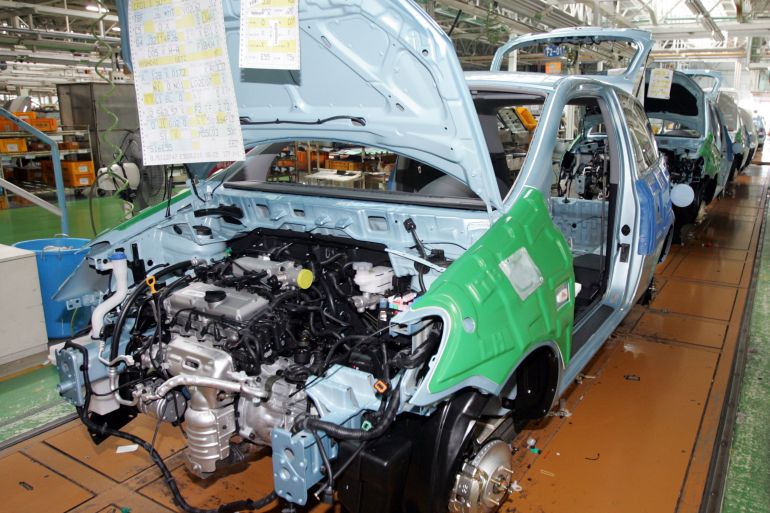Asia’s factories hit by global slowdown, China’s COVID curbs
Factory output shrinks in South Korea, Taiwan and Malaysia amid rising fears of a global recession.

Asia’s factory output weakened in October as global recession fears and China’s zero-COVID policy have hurt demand, according to business surveys, adding to persistent supply disruptions and darkening recovery prospects.
Further interest rate hikes in the United States are also expected to force most Asian central banks to prevent sharp capital outflows by tightening their monetary policies, even if it means cooling already soft economies, analysts say.
Keep reading
list of 4 itemsCan a new British prime minister fix the economy?
To save its economy, Sudan needs civilian rule
Xi tightens grip on China, what does this mean for the economy?
Manufacturing activity shrank in South Korea, Taiwan and Malaysia in October, and expanded at the slowest pace in 21 months in Japan, surveys showed on Tuesday, highlighting the pain from slowing Chinese demand and stubbornly high import costs.
China’s Caixin/S&P Global manufacturing purchasing managers’ index (PMI) stood at 49.2 in October, up from 48.1 in September but remains below the 50-point mark that separates growth from contraction.
The private sector survey was in line with an official PMI survey released on Monday that showed China’s factory activity unexpectedly fell in October.
“Asia is extremely reliant on China. Its zero-COVID policy continues to disrupt supply chains and keep Chinese travelers from returning to Asian tourist destinations. It’s also hurting the region’s exports,” said Toru Nishihama, chief economist at Dai-ichi Life Research Institute in Tokyo.
“Another big risk is the pace of US rate increases. If the Federal Reserve continues to hike rates steadily, that could ignite capital outflows from Asia and hurt exports.”
Japan’s au Jibun Bank Japan Manufacturing PMI fell to 50.7 in October from September’s 50.8 final, marking the weakest growth since January last year.
South Korea’s factory activity shrank for a fourth month in October as orders for exports fell for an eighth month, the PMI showed.
That followed data that showed South Korea’s exports fell the most in 26 months with shipments to China, its largest market, extending declines.
“Given the country’s open economy and its subsequent reliance on exports, the looming global downturn certainly poses a downside risk for future growth,” Laura Denman, an economist at S&P Global Market Intelligence, said on South Korea’s PMI.
Taiwan’s PMI slid to 41.5 in October from 42.2 in September, while that for Malaysia fell to 48.7 from 49.1, surveys showed.
Factory activity in Indonesia expanded at a slower pace in October, with the PMI standing at 51.8, down from 53.7 in September.
The International Monetary Fund cut Asia’s economic forecasts as global monetary tightening, rising inflation blamed on the war in Ukraine, and China’s sharp slowdown dampened the region’s recovery prospects.
The fallout from China’s strict COVID-19 curbs continues to broaden, forcing the temporary closure of Disney’s Shanghai resort and hitting production of Apple Inc iPhones at a major contract manufacturing facility.